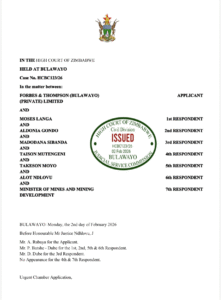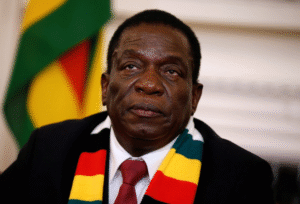DENIAL OF VOTER’S ROLL ACCESS BY ZEC JEOPARDISES FAIR ELECTIONS IN ZIMBABWE
In the lead-up to the highly anticipated general elections in Zimbabwe, the Zimbabwe Electoral Commission (ZEC) has sparked controversy by refusing to release the voter’s roll. This decision has raised concerns among opposition parties, civil society organisations, and international observers, who fear that the lack of transparency could undermine the credibility of the electoral process and threaten the foundations of a free and fair election.

The voter’s roll, a critical component of any democratic election, contains the names and details of all registered voters. It serves as a means to verify the eligibility of voters and prevent electoral fraud. By denying access to this essential document, the ZEC is not only breaching Zimbabwe’s electoral laws but also contravening international best practices.
Opposition parties have been particularly vocal about their concerns, as they believe the refusal to release the voter’s roll is a tactic employed by the ruling party to manipulate the electoral process in their favour. This suspicion is not unfounded, as Zimbabwe has a history of electoral irregularities, voter intimidation, and violence, all of which have been used to sway the results in favour of the ruling party.
Civil society organisations have also expressed their apprehension, pointing out that the lack of transparency surrounding the voter’s roll could lead to the disenfranchisement of many eligible voters. Instances of voter suppression, such as the removal of names from the roll without justification or the inclusion of deceased or ineligible individuals, could significantly impact the outcome of the election.
International observers, including representatives from the African Union, the European Union, and the United Nations, have called on the ZEC to uphold democratic principles and release the voter’s roll. Their concern is rooted in the potential for the electoral process to be compromised, which would cast doubt on the legitimacy of the election results.
The ZEC’s refusal to release the voter’s roll also raises questions about its independence and impartiality. While the commission is constitutionally mandated to be independent, critics argue that its current composition is heavily influenced by the ruling party. This perceived lack of autonomy casts doubt on the ZEC’s ability to conduct a transparent and unbiased electoral process.
Furthermore, the secrecy surrounding the voter’s roll undermines public trust in the electoral process. In a nation with a history of contested election results and political instability, maintaining the confidence of the electorate is essential for the peaceful transition of power. The refusal to disclose the voter’s roll erodes this trust and fuels speculation about the fairness of the upcoming election.
To mitigate these concerns and ensure a credible electoral process, the ZEC should release the voter’s roll as soon as possible. This would demonstrate the commission’s commitment to upholding the principles of democracy and transparency. Additionally, the involvement of civil society organisations and international observers in scrutinising the voter’s roll would help identify and address any discrepancies, bolstering public confidence in the electoral process.
The ZEC’s refusal to release the voter’s roll poses a significant threat to free and fair elections in Zimbabwe. This decision undermines the credibility of the electoral process, heightens suspicions of foul play, and jeopardizes the nation’s journey towards a more democratic and stable political landscape. It is crucial for the ZEC to act in the best interests of the Zimbabwean people and release the voter’s roll, ensuring a transparent and fair electoral process. Only then can the nation move forward with confidence in its democracy.





